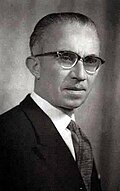| |||||||||||||||||||||||||||||
All 172 seats in the Parliament of Syria 87 seats needed for a majority | |||||||||||||||||||||||||||||
|---|---|---|---|---|---|---|---|---|---|---|---|---|---|---|---|---|---|---|---|---|---|---|---|---|---|---|---|---|---|
| |||||||||||||||||||||||||||||
 Results by governorate | |||||||||||||||||||||||||||||
| |||||||||||||||||||||||||||||
Parliamentary elections were held in Syria on 1 and 2 December 1961. [1] The People's Party remained the largest party in parliament, winning 33 of the 172 seats. These were the last multi-party elections in Syria before the Baathist coup in 1963.



